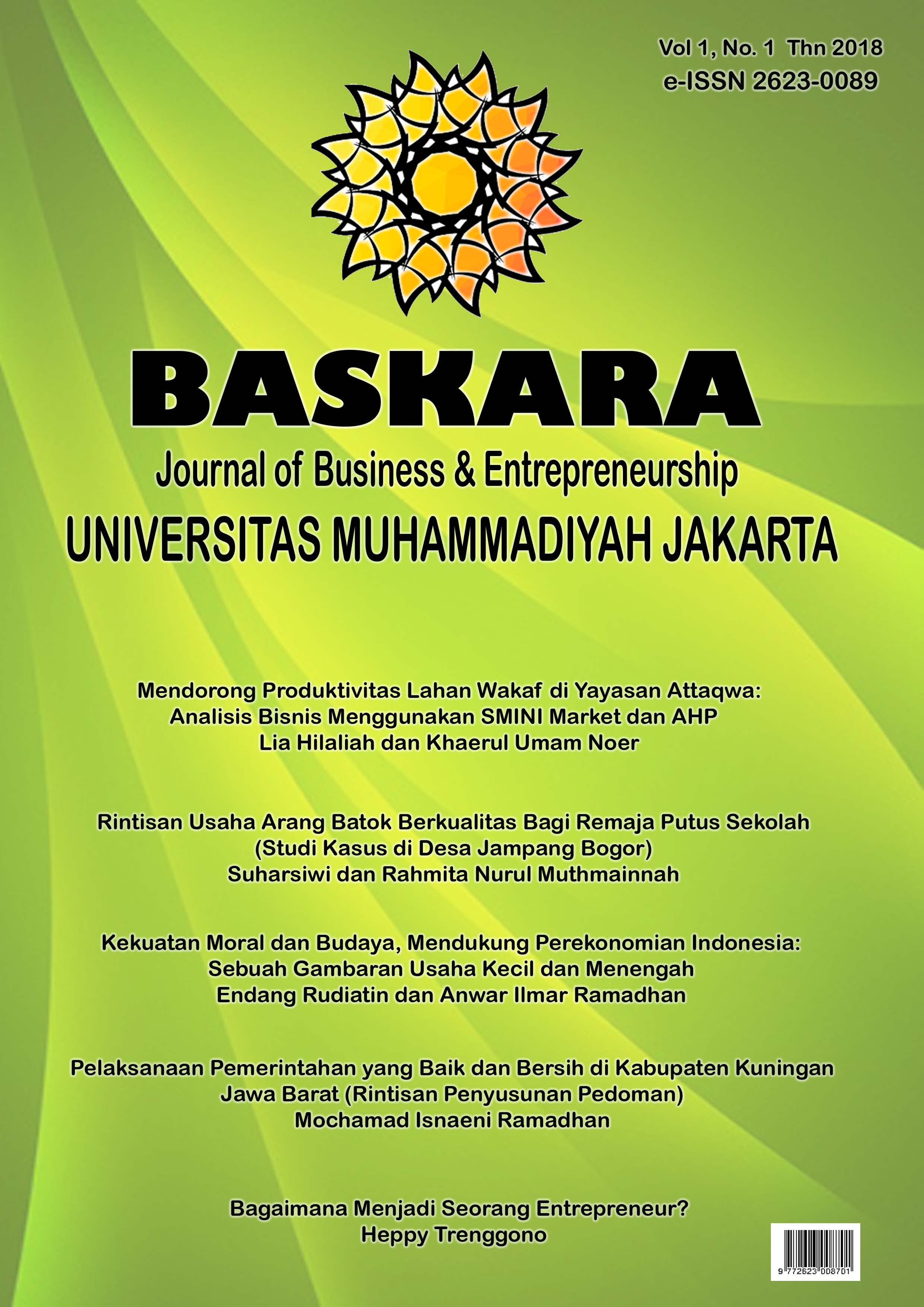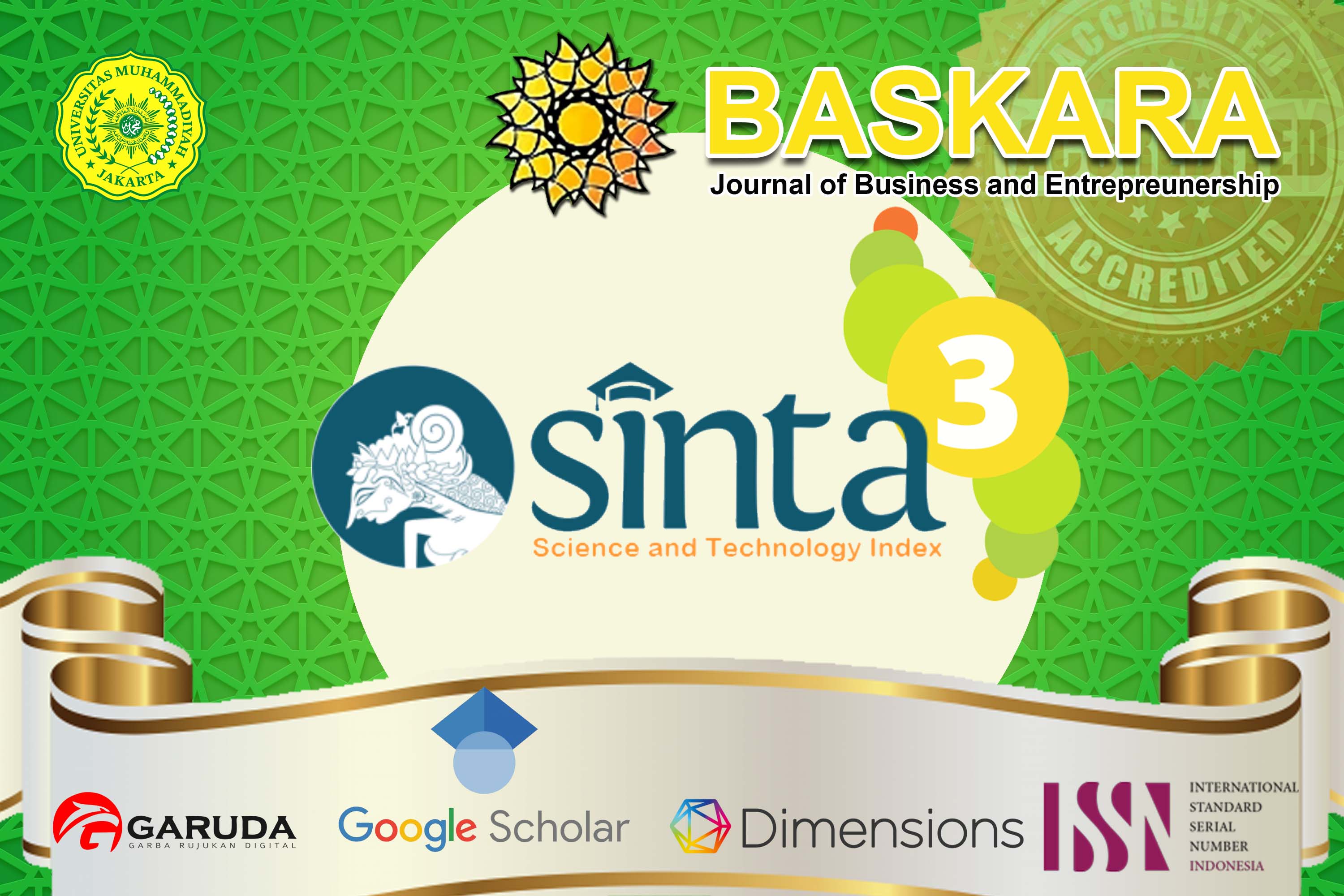Kekuatan Moral dan Budaya, Mendukung Perekonomian Indonesia: Sebuah Gambaran Usaha Kecil dan Menengah
DOI:
https://doi.org/10.54268/baskara.v1i1.5292Abstract
“UMKM telah menjadi backbone dan buffer zone yang menyelamatkan negara dari keterpurukan ekonomi”, kalimat ini senantiasa didengung-dengungkan dalam setiap pertemuan para birokrat dan pakar serta pengamat ekonomi. UMKM pun menjadi sorotan dan senantiasa diteropong dalam berbagai masalah nasional berkenaan dengan, penanggulangan kemiskinan, pengangguran dan kenaikan nilai PDB (Product Domestik Bruto) negara. UMKM diyakini berpotensi memberi sumbangan bagi pertumbuhan ekonomi nasional. Secara historis UMKM dalam kegiatan ekonominya lebih menonjol pada moral (agama) dan budaya daripada terstruktur dalam teori-teori profit, maksimalisasi dan free kompetitif. Dalam teori Antropologi Ekonomi kerap dideskripsikan bahwa, proses ekonomi dalam masyarakat UMKM menggambarkan bentuk perilaku yang ber tipe kekerabatan, terikat pada ritual keagamaan, berbagi rezeki dan juga resiko serta menuntut “kepercayaan” dalam transaksi di antara mereka. Fenomena inilah sesungguhnya yang memungkinkan pengusaha UMKM lebih tahan dalam menghadapi krisis, refleksi penelitian penulis terhadap ekonomi usaha kecil di kota Jakarta. Penggambaran bentuk kegiatan ekonomi ini menjadi dasar pemikiran penulis ketika para ahli tengah mencari bentuk sistem ekonomi nasional yang berbasis ekonomi rakyat dan ketika para pelaku UMKM cenderung dijadikan sandaran untuk menyelesaikan permasalahan ekonomi nasional.References
Acheson J (ed.) 1994, Anthropology and Institutional Economics. Monographs in Economic Anthropology, Society for Markets: Anthropological Aspects Economic Anthropology. University Press of America, Lanham, MD
Anisa, dkk, 2018, Eksplorasi Kondisi Fisik Dan Non Fisik Pada Pemukiman Pengolahan Hasil Perikanan Tradisional Di Kampung Nelayan Pengasinan, Muara Angke, Langkau Betang, Jurnal Arsitektur Untan, Vol 5, No 1 (2018) http://jurnal.untan.ac.id/index.php/lb/article/view/25771
Bates, Robert H., 1981, Markets and States in Tropical Africa: The Political Basis of Agricultural Policies, University of California Press, 178 pages
Carsten, Janet. 1989. Cooking Money: Gender and the Symbolic Transformation of Means of Exchange in a Malay Fishing Community. In J. Parry and M. Bloch (eds.): Money and the Morality of Exchange.
Eisenstadt, Schmuel, 1968, Social Institution, David L.Sills, ed. The International Encyclopedia of The Social Sciences, 16 edition, hlm. 283-291
Eisenstadt and Roniger, 1984, Patron, Client and Friends: Interpersonal Relation and The Structure of Trust in Society, London, Cambridge University Press
Gellner, 1995, Ernest, Membangun Masyarakat Sipil: Prasyarat Menuju Kebebasan Aswab Mahasin (Introduction), Ilyas Hasan (Translator)
Geertz, Clifford, 1978, "The Bazaar Economy: Information and Search in Peasant Marketing." American Economic Review 68:28-32.
_____, 1963, Peddlers and Princes Social Development and Economic Change in Two Indonesian Towns
Kunio, Yosihara, 1990, Kapitalis Semu di Asia Tenggara, LP3ES
Long, Norman, 1986, The Commoditization debate: labour process, strategy and social network, Agricultural University Wageningen
Listiyandra, Krishna, dkk, 2016, Kontribusi Wanita Nelayan Dalam Upaya Pemenuhan Kebutuhan Ekonomi Keluarga Nelayan Di Muara Angke Kecamatan Penjaringan Jakarta Utara, Jurnal Perikanan Kelautan Vol. VII No. 2 /Desember 2016 (80-90), http://jurnal.unpad.ac.id/jpk/article/view/11364
Nida, Nadhia, R.A, 2016, “Buruh Angkut dan Keluarga Nelayan di Pelabuhan Muara Angke” Lembaran sejarah, Jurnal UGM, Vol 12, No 1, 2016, https://jurnal.ugm.ac.id/lembaran-sejarah/article/view/25519
Plattner, Stuart, 1989, Economic Anthropology, Ed. Stanford University Press, Stanford, CA, 1989. xiv, 487 pp.
Rudiatin, Endang, 1997, “Kepercayaan dan Kesetiaan: jaringan Sosial Masyarakat Nelayan di Muara Angke Jakarta”, Thesis Pasca Sarjana, Universitas Indonesia
Sunimal, Fernando, 1985, The Marketing System in The Small Scale Fishery of Srilanka: Does The Middleman Exploit The Fisherman?, in “Small Scale Fisheries in Asia” Socioeconomic Analysis and Policy, ed. Theodore Panyotou, The International Development Research Centre , Ottawa Canada, pp 12-31
Indonesian Economy: Micro, Small & Medium Sized Enterprises 03 Agustus 2016 https://www.indonesia-investments.com/id/news/todays-headlines/indonesian-economy-micro-small-medium-sized-enterprises/item7068?
ILO, 2017, “Indonesia policy makers to better coordinate on SME policies” 22 June 2017 http://www.ilo.org/jakarta/info/public/pr/WCMS_561816/lang--en/index.htm.
Downloads
Published
Issue
Section
License
In order for Baskara: Journal of Business and Entrepreneurship to publish and disseminate research articles, we need publishing rights (transfered from author(s) to publisher). This is determined by a publishing agreement between the Author(s) and Baskara Journal. This agreement deals with the transfer or license of the copyright of publishing to Baskara: Journal of Business and Entrepreneurship, while Authors still retain significant rights to use and share their own published articles. Baskara : Journal of Business and Entrepreneurship supports the need for authors to share, disseminate and maximize the impact of their research and these rights, in any databases.
As a journal Author, you have rights for a large range of uses of your article, including use by your employing institute or company. These Author rights can be exercised without the need to obtain specific permission. Authors publishing in Baskara : Journal of Business and Entrepreneurship have wide rights to use their works for teaching and scholarly purposes without needing to seek permission, including:
- use for classroom teaching by Author or Author's institution and presentation at a meeting or conference and distributing copies to attendees;
- use for internal training by author's company;
- distribution to colleagues for their reseearch use;
- use in a subsequent compilation of the author's works;
- inclusion in a thesis or dissertation;
- reuse of portions or extracts from the article in other works (with full acknowledgement of final article);
- preparation of derivative works (other than commercial purposes) (with full acknowledgement of final article);
- voluntary posting on open web sites operated by author or author’s institution for scholarly purposes.
Copyright Transfer Agreement for Publishing (Publishing Right)
The Authors who submit manuscript has to understand that if accepted for publication, mean that all copyright and publishing right of the article shall be assigned/transferred to Baskara: Journal of Business and Entrepreneurship as assigned publisher.
- CC BY-NC: This license allows reusers to distribute, remix, adapt, and build upon the material in any medium or format for noncommercial purposes only, and only so long as attribution is given to the creator.
It includes the following elements:
BY ![]() – Credit must be given to the creator
– Credit must be given to the creator
NC ![]() – Only noncommercial uses of the work are permitted
– Only noncommercial uses of the work are permitted
Baskara (C) Copyright (2022):
BASKARA: Journal of Business and Entrepreneurship by https://jurnal.umj.ac.id/index.php/baskara
is licensed under a Creative Commons Attribution-NonCommercial 4.0 International License








